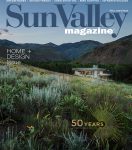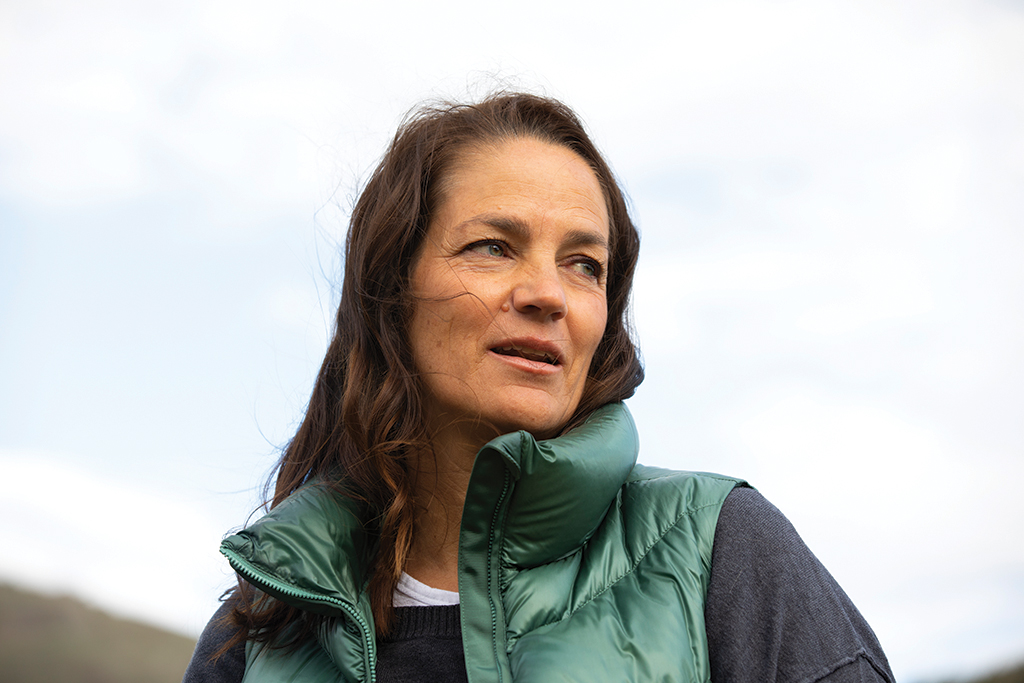I moved here from Rhode Island with another friend of mine when I was 22. I ended up staying for a summer and that was what hooked me. I think that was 31 years ago. I grew up here, in a way.
The funny thing about getting the coronavirus is, I don’t travel very much. I don’t go anywhere. For me to get it was kind of crazy.
I think I contracted it on March 6th. I had been at the River Run Lodge with a good friend of mine and we had met up with a bunch of other people. On Saturday morning, I skied a little bit and then worked a wedding at the River Run Lodge. When I work a wedding, it’s at least a ten-hour day and it’s a lot of heavy lifting. So, I was feeling sluggish on Sunday. Monday morning I went to work, still feeling a little tired. But I often feel that way after weddings.
Then on Tuesday morning, bam. It was like someone dumped a bucket of sickness over my head and it glued me to my bed. I don’t think I got up out of my bed for three days, at least.
On Thursday morning, I finally said ok, I’ll call the doctor.
Thinking back to that week before, you were hearing about COVID but it wasn’t at the front of my mind. I remember thinking to myself: I live a very simple life here. I go to work, I take care of my kids, I don’t really go anywhere. I don’t have to worry about anything like that.
They had just started getting the tests and I was one of the first ones up here to get tested, so in that respect, I think my timing was perfect. I got my test results back within 24 hours. As soon my positive result came out, that started everything shutting down. I watched the social media feeds and the local news and it was like seeing human nature at its worst. People were trying to figure out who I was and where I lived. They got so many things wrong about me.
By Saturday, it was talk of the town. It spread like wildfire.
It’s all so surreal. It was like a crazy movie. It was traumatic because nobody knew anything. What was in store? How long was this going to last? I remember thinking: How did I get here?
I’ve lived here a long time, I’ve worked a lot of jobs that have put me in situations where I meet a lot of people. But that kind of popularity or notoriety is unsettling. It still is.
There were a couple of people early on that came out of nowhere who supported me. They were people that I knew and was friendly with, but they were not in my immediate circle. But they were the ones who came out of nowhere and supported me. I’m so much better at giving than receiving, and that was hard for me at first. Then I told myself: you have to accept what people are offering. So I learned to gracefully take the dinners that were being dropped off.
This experience has definitely changed me. It’s made me more calm. I have a lot more gratitude for my family than I had had before. I watched a lot happen, to me and to my family, on the gossip front. And that has changed me: I don’t want to be a teller of tales, saying things like: Did you hear? Or Did you know? It also made me rethink who my true friends are.
My acupuncturist said to me one day: Do you know how loved you are in this community? She has said: ‘There is nothing but great things that people were saying about you when this was all coming out. You have such support behind you.’
I don’t know if that’s something you ever think about yourself. It was nice to hear. In my mind, that took away all of the negative stuff. When she said that I felt validated.
People just need to be kind. This world is so divisive right now.
—
Debbie Bacca
Sun Valley, Idaho
May 24, 2020
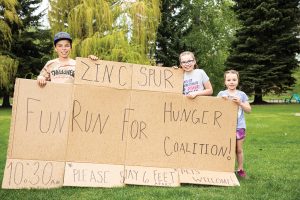
Liam Jensen, 12 (left), Skyler Jensen, 11 (middle), Pressley Jensen, 6 (right).
“My teacher gave us a writing assignment, asking: How can one of your passions make a change
in the world?
I was sitting at my desk thinking of all of my passions. I thought: ‘Okay, so I love skiing and soccer.’ Then, I was thinking about Heron Island, which is this little island on Puget Sound that we go to every summer. You get to swim and it’s really fun. Then I thought of this fun run that my grandpa would host on the island. We would just run around the island and get first-, second- and third-place ribbons for our age group.
I thought: ‘If we can’t do it there, why don’t we just bring the run here.’
So I decided to organize the fun run here in Hailey. But I thought: You can’t just run to save the world. Hungry families have tripled in the last week. Maybe I should do it for The Hunger Coalition.
So I was like, that’s a really good idea to raise money. So I agreed to walk around the neighborhood and pass out fliers.
I was nervous that no one was going to show up and it was going to be such an embarrassment for me. I was scared that I would walk around the whole neighborhood and ask everyone to come to my fun run and nobody would show up.
On the day of the run, basically all of Willow Road came. After five families showed up, I said: ‘Wow, this is going really, really well.’
I felt really, really great. It was a flush of happiness and joy. Like: yes, that wasn’t too bad. It was really fun and everybody had a good time and I raised over $2,000. I think I did inspire people to give their money instead of just keeping it for themselves.
It really did inspire me to do more.”
—
Skyler Jensen
Hailey, Idaho
May 21, 2020
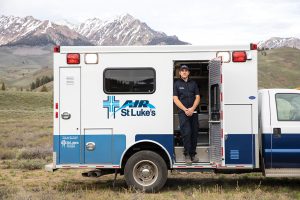
Eric Demmet, EMT paramedic, Ketchum Fire Department.
“I was born in Mount Kisco, New York. Then we moved to Wisconsin, Massachusetts and New Hampshire. My dad was a hockey player and a hockey coach. He was a biology teacher so we generally moved for his jobs. He took a job coaching at Dartmouth College up in New Hampshire. I’ve lived in Ketchum for 17 years.
In 2005, I became a volunteer EMT for Ketchum Fire. I was on ski patrol as well, starting in 2006. I knew that I liked being in those situations where people needed help. It felt like a natural progression to go to paramedic school.
I wanted to see how I can give back to this community. I’m an EMT paramedic which is an extension of a doctor but out in the field. You do a lot more advanced life-saving interventions than basic life support.
It was a big shock to the system to see how serious COVID was getting across the country. Ketchum was making national news for the wrong reasons, having the highest per-capita cases in the nation.
My work role shifted that Saturday, March 21st, when we saw the cases explode at the local hospital. At that time we had one ventilator in the entire hospital in Ketchum. We don’t have an ICU, nor do we have the capacity to take a whole lot of critical care patients.
The demand for transporting patients to other facilities in Twin Falls and Boise went through the roof. That’s when it all changed for me. We were having eight to 12 transports per day. I was on for 13 days in a row and I transported 19 COVID patients.
It was like being under siege. And when it happened, Ketchum Fire and Wood River Fire dedicated crews just to do transports out of the hospital. I think that’s indicative of the community. When things get hard, we bond together and pool our resources.
The biggest difference in treating these patients was the fear in people’s eyes. There is so much uncertainty with how much each individual will react to the virus. Your loved ones can’t even come and see you in the hospital. That adds another element of fear and isolation that we’re not used to.
It was hard and heavy but that’s why I do this job. I’m grateful that I have the training and education to help out now. I want to be available and help out when called upon. There is no reason not to.”
—
Eric Demmett
Ketchum, Idaho
May 24, 2020
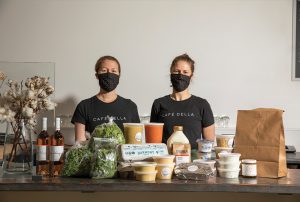
Café Della Founders, Liza Green (left) and Ashley Krepps (right).
Liza: I kept a journal while all of this was unfolding. I sensed quickly that this was going to be a time that we were going to want to know: What happened when and where?
All of a sudden things started to happen really quickly here. Then we decided that we should close for two weeks. It became very clear to us by looking around the community, because everyone shut down pretty much all at once, and if you read anything about what’s going on with The Hunger Coalition which is our local food bank, their demand skyrocketed. At the same time, we had very close family and friends saying: How can we help you? We want to give you money.
We thought, well, this is weird, what do we do with this money? So pretty quickly and organically we said: We should use this money to feed people who are out of work in the hospitality industry. We originally targeted local restaurants and hotel employees who are out of work. We saw that people were really hurting and we had people that really wanted to support us. What can we do with those two things? Obviously, we have the capacity to be feeding people nourishing meals, so let’s do it.
There was one customer in particular. She would just buy dinners. The way that it works is, if you bought a dinner for yourself, we would donate one to a family. She would just buy dinners and donate all of it. She was one of the first people to purchase the family meal and the order came through and she had ordered four of them and each meal was supposed to feed a family of four. She said: I don’t want the four that I bought. So we were able to feed eight families of four. And she came back and did it again and that was super cool.
We’ve had this amazing response from our community in terms of
people respecting and appreciating what we do. However, we continue to try and figure out how to translate that into consistent day-to-day sales. People love what we are doing but that doesn’t necessarily mean they were in here every single day. One of the things that happened that I thought was particularly eye-opening was that we could name maybe a dozen to two hundred customers that really were our core group. And a lot of them just disappeared. People may be sick or they may be scared. They may be at home. They may be having financial issues of their own. There is a whole host of reasons why people might be cooking more at home. There is a laundry list of reasons why people aren’t going out to restaurants. We went to our email list and we went to our social media following—we actually have a strong following—but our regular day-to-day customers were not to be found in those contact lists and followings. Because they are in here with us every day. We found ourselves in this place: we don’t even know how to communicate with our core customers.
Those people are just starting to peek back out of the woodwork. We’re starting to have them resurface. We have this really strong core group of followers. By then, all of a sudden, to feel like you flipped the switch overnight and those people were gone, it’s petrifying.
Ashley: At the same time, we gained new customers.
Liza: We’ve only been open for 11 months and it’s been really hard. The year has already been a rollercoaster anyway. I feel like we have done a really good job of staying focused and going back to our original business plan and trying to stick with our original vision. It’s a lot of questioning of yourself. There’s a lot of uncertainty
Ashley: We met in Jackson Hole, Wyoming, fifteen years ago. We were roommates. That’s when we started bonding over food. We stayed friends over the years. We had different experiences and lived in different places. We traveled and had different career experiences, but it’s always been a pipe dream.
Liza: There is this whole category in the food industry … “better than at home” is what they call it. It’s basically like: if you were a really amazing cook, what would you make for yourself every single day that is nourishing, exciting, delicious, and also balanced?
One of the things that was really important to us in creating this concept is that it can be something that felt like a treat but something you could do every day.
Ashley: We found the space and it was just hard to pass up.
Liza: Last week it all hit me—the stress of navigating the COVID world. For me, the weight of that is heavy. I think we did a pretty good job of pivoting really quickly and setting up our online store, doing pickups and deliveries.
We are one hundred percent optimistic for our business, but that doesn’t mean that it’s not petrifying right now. For me, this experience over the last couple of months has truly hammered home the importance of supporting small businesses and local businesses.
If we want our communities to be any semblance of what they used to be, we have to all be stepping out and supporting everyone right now. If we don’t go out of our way to do that, there are a lot of businesses that aren’t going to make it.
—
Liza and Ashley
Café Della, Hailey, Idaho
May 25, 2020
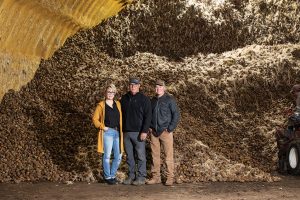
Third and Fourth-generation potato farmers, Jill (left), Mark (middle), and son Wyatt Johnson (right).
Mark: Jill and I grew up in the Magic Valley and after we got married I went to work for her dad at Cummins Farms in Murtaugh, Idaho. We worked there for 19 years and when they quit growing potatoes we bought out the business up here in Picabo and started growing potatoes in the Bellevue Triangle.
We start with early-generation potatoes and grow them. In the fall, they are harvested, then they are in storage all winter. In early March, we start shipping them to commercial growers in the Magic Valley. They grow them the next year either for processing or they go to restaurants and supermarkets. When COVID hit, we were right in the middle of our busy season.
Jill: For one thing, we all got the coronavirus, probably around March 15th. My son’s girlfriend is a schoolteacher and starting showing symptoms. My son, his girlfriend, me and Mark were all quarantining together. On the 23rd, we finally decided to get tested. We drove up to the tents. That was a surreal experience and kind of emotional.
Mark: I had to quarantine during the busiest time of year for us. If the crew would have gotten it, it probably would have wiped us out. We wouldn’t have been able to do anything because these potatoes have to go out right now. We were sending 20 of these truckloads out per day.
Jill: That was a little emotional, too, just trying to figure out what the right thing to do was. We wanted to save our business at the same time, not endanger other people. When you have Covid, your brain isn’t thinking right. You can’t problem solve. Everything felt really huge.
Mark: The market had dropped almost in half. We lost our market for them so we decided to start giving them away and try to help people. We gave away about 300,000 pounds of potatoes.
Jill: A true Idaho potato farmer is kind of a rare thing. We are just one little tiny grower. Tons and tons of growers are dumping tons and tons of potatoes. Another potato farmer in Oakley, Idaho, named Ryan Cranney, was the first person dumping a big pile of potatoes and telling the community: come and get them. So then we used his idea and posted a photo to Facebook.
It just kind of blew up on social media and a local woman named Molly Page helped to spread the message. We have seen the good that is inherently in people, wanting to help others. The endless amounts of people offering to pay us has been overwhelming. We’ve received countless thank-you letters.
Mark: It just, just feels good to help people out when they’re struggling. It definitely brought our community together.
Jill: I feel full of hope. Especially if we can be more compassionate and loving towards one another. We all need to give each other a little bit of grace and understanding. Springtime is a time for growth and rebirth.
I feel like we as a community and as a country will come out of this
better for it.
—
Mark and Jill Johnson
Picabo, Idaho
May 26, 2020
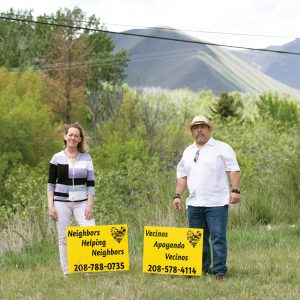
Tammy Davis (left) and Herbert Romero (right), jointly working on their “Vecinos apoyando Vecinos” / “neighbors helping neighbors” initiative.
Herbert: I’m from the South LA area. Most of my family is still there. I’ve always done nonprofit work. The gang and racial violence was very heavy in my neighborhood. I wanted to be part of the solution. So I got into different areas of the nonprofit world, mostly working with social issues like substance abuse, domestic violence, parenting and dropout prevention.
When my wife and I first moved here, I was just resting and doing my assessment to find out what was happening. I learned that our Hispanic community was very divided. I said: ‘We need to start a conversation and create unity in our culture. We need a presence of unity. And that’s my world. I cannot stay quiet about it.’
How do you create a presence? Taking the time and being non-judgmental. I went to my Latino community and I started talking to them. Not just one time; I would go back and I would go back again.
What I learned is this: There is a disconnect between the resources. This valley is very rich, but a lot of our kids don’t have access. The mountains are right there, but our kids have never been. We’ve already started building those bridges so that they can get out and experience the beauty of this valley.
Tammy: I am the Executive Director of the Crisis Hotline. The organization has been around since 1987. I’m a City Councilwoman for the town of Bellevue. I would sit there at our City Council meetings and say: ‘We need to do more to include our Hispanic community. We represent them. We’re the people who have the responsibility to take care of things.’
Herbert: So on Monday, March 16th, Tammy, myself and Jan (a staff member of the Crisis Hotline) spent five hours writing the Neighbors Helping Neighbors plan in response to the COVID outbreak. We asked: What does the neighborhood need? We decided to offer a three-fold service. First, we established a 24/7 bilingual family support line with a Hispanic staff. We also distributed family care packages and information with resources and support in English and Spanish. And we created a bilingual Crisis Hotline. To attract attention, we placed hundreds of yellow Neighbors Helping Neighbors signs along the highway.
Tammy: It can’t be just one approach, it has to be multidimensional. Just like we are as people, multidimensional. We’re doing the outreach to the families. We’re not wondering what people are doing, we’re in it with them. After every outreach, we’re discussing it right away. How do you feel like that went? How can we make it better? We’re making sure that our impacts are valuable so that we aren’t wasting time or energy.
Herbert: And when I was going to these different meetings about responding to COVID in the beginning of April, I saw a lack of Hispanic representation. You have all of these circles doing incredible work to respond to COVID, but I was the only Hispanic person in that circle.
I decided to bring together a group of Hispanics in an organized way and ask the questions: What is the gap? What is the need? We’ve been meeting once a week for the last two months, discussing anything that deals with Hispanic issues, concerns, or initiatives. For example, Ruby Garcia from St. Luke’s tackles health, NAMI focuses on the social and emotional support with the Crisis Hotline, and the Blaine County Charitable Fund addresses rent assistance. From funding to mental health, we discuss how to get the word out.
Tammy: Herbert put real wind underneath my wings to help it happen [the inclusion and outreach] and we complement each other well. We are really a great team, and we strategize every week with our volunteers. We talk constantly. We’re very supportive of each other. This is boots on the ground. Because if you want to make something work, you don’t talk about making it work, you figure out how to make it work and you do it. Because it has to be done.
We want to empower. We don’t want to tell people what to do, we’re not here to save them. They have the tools they need and they are just in an emotional mindset just like us, trying to attend to what’s happening [in the world today]. It’s a new paradigm. This is building strength and empowering the community.
Someone said to me: ‘Tammy, you can’t help everyone.’ And I was like: why not? Why can’t I? I mean, that’s what we do. I love my job, I couldn’t imagine doing anything else.”
—
Herbert and Tammy
Hailey, Idaho
May 26, 2020

